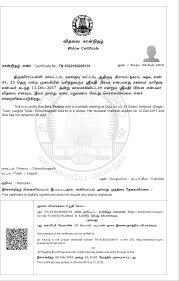Varisu certificate is the legal document needed by the surviving members to establish their claim over the late family member’s properties or dues. Varisu certificate or legal heir certificate (in English) includes the name(s) of the legal heir(s) of the deceased and their relationship with the deceased. Thus, it helps in determining the appropriate successor. Varisu Certificate, in Tamil, is also known as Varisu Sandrithal.

What is the purpose of Varisu certificate or legal heir certificate?
- Property transfer: The main purpose of a Varisu certificate is the transfer of movable or immovable properties and assets of the deceased to the legal heirs. Further, transfer of properties of the deceased or purchase of ancestral property is possible only if one has the Varisu certificate.
- Claiming legal ownership: Having a legal heir certificate helps in the identification of the legal owners after a person’s death. It helps in preventing litigation cases by showing the Varisu certificate as proof of legal ownership.
- Bank and financial claims: The legal heirs of a deceased person are eligible to claim insurance policy benefits, provident fund and gratuity of the deceased upon the person’s demise.
- Sanction of family pension and other benefits: The legal heirs can claim their right to receive family pension. They get the right to receiving salary arrears (for state/central government employees).
- Employment: The legal heirs of the deceased individual are eligible to gaining employment on compassionate grounds, provided they prove they are the legal heirs.
- Transfer of facilities: Transfer of deposits or investments and utilities is possible if one has the legal heir certificate.
- Loan application: When legal heirs decide to use the inherited property for a loan against property, the Varisu certificate is required for verification by financial institutions.
Eligibility
- Wife of the deceased.
- The child of the deceased.
- Father or mother of the deceased.
- Sibling of the deceased.
Documents Required
- A self-undertaking affidavit.
- Identity proof of the applicant.
- Address Proof of all legal heirs.
- Date of Birth Proof of all legal heirs.
- Death certificate of the deceased person.
- Death certificate of the deceased direct legal heir.
- Residence Proof of the deceased.
How to Apply
Step 1: Approach Taluk/Tahsildar Office The applicant has to visit the nearby Taluk or Tahsildar Office.
Step 2: Receiving the Application Form The application form can be obtained from the Taluk office at a cost of Rs.60
Step 3: Submission of the Form After entering all the details in the form, the applicant has to submit the form to the Taluk office. After submission of the form, the applicant receives two tokens to meet the concerned VAO/RI after a couple of days. Now, the applicant has to enter the following information at the back of the respective forms:
- In the first form, details of the applicant have to be given.
- In the second form, the applicant has to mention 10 references for further verification.
After entering all these details, the applicant has to get the signature of the VAO along with the presence of all the legal heirs.
Step 4: VAO Signature and Seal The VAO after checking the legal heirs affixes his signature and seal.
Step 5: Submission to the Revenue Inspector The application signed by the VAO has to be submitted to the Revenue Inspector after which, he visits the applicant’s home for verification.
Step 6: Submitting to the Tahsildar Officer The applicant has to submit the RI and VAO form to the Tahsildar office and get a token number.
Step 7: Issuing the Certificate Once the token number is given, a Tahsildar issues the certificate within 16 days from the date of submission of the form.
FAQs
Legal heir certificate vs succession certificate?
| Parameter | Legal heir certificate | Succession certificate |
| Definition | A legal heirship certificate is issued to legal heirs claiming the deceased’s movable or immovable assets. | A succession certificate is a document used for succession purposes, such as claiming the debts, dues and financial assets of the deceased. |
| Authority that issues the certificate | Local municipal authority or revenue department | Civil court under the jurisdiction of the district where the deceased lived |
| Validity | The document is valid for lifetime | The document is valid until the purpose for which it is obtained is achieved |
| How long it takes to obtain it? | A few weeks to around two months | It can take several months owing to legal processes involved |
Is the Varisu Certificate applicable for multiple properties?
Yes, the Varisu certificate obtained by a legal heir can be used to claim multiple properties owned by the deceased person. Besides properties, the Varisu certificate is used to claim debts, securities and other assets of the individual.
